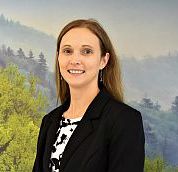By Macy Roberts, CEHHS Student Reporter, Class of 2024
As members of the College of Education, Health and Human Sciences’ Child and Family Studies Department at the University of Tennessee, Knoxville, graduate student Hannah Thompson and assistant professor Lori Caudle were awarded a $5,000 Student/Faculty Research Award for their project entitled, “Social Emotional Learning Trauma-Informed Intervention Preschool Study (TIIPS): A Partnership with Rural Southeastern Teachers.”
Previously, this research was unfunded, so receiving the Student/Faculty Research Award means there is now financial support for main project activities, stipends for partnering teachers and research materials, such as a 360-degree smart camera.
The research-practice-partnership uses a trauma-informed intervention framework to foster children’s social emotional development and prioritize workforce well-being among educators.
The partner school in the study is located in a small mountain town outside of the Qualla Boundary, home of the Eastern Band Cherokee Indians, where Caudle and Thompson work with local educators to collect child-level data through classroom observations, engage in reflective coaching and support educators through professional learning community meetings. They also hope to implement bug-in-ear consultation to support teachers through challenging behaviors in the classroom.
The two CFS representatives will also be working with Cathy Grist, a developmental psychologist specializing in early childhood social emotional interventions, as well as a professor and Birth-Kindergarten program director at Western Carolina University.
Throughout the partnership, Caudle and Thompson aim to identify how their efforts support teacher well-being, trauma-informed practices and classroom-level interventions. They also intend to analyze whether or not the partnership resulted in improved social emotional competencies and behaviors in children.
According to Caudle, there is a widely recognized need for trauma-informed practices in Pre-K education. However, there has been little research conducted that prioritizes trauma-informed professional development for early childhood educators.
“There is a need for intergenerational interventions that include adults with adverse childhood experiences histories to break the cycle of negative outcomes and develop concrete plans that enhance resiliency and promote healing,” Caudle said.

Lori Caudle
Caudle recognized the importance of these intervention plans in rural schools in the Appalachian region of the Southeastern U.S., given these communities face higher risk factors and generational trauma due to ongoing social inequities and a lack of upward mobility. Furthermore, the COVID-19 pandemic increased the need for interventions in these areas particularly.
“An important note about our work is that we are actively supporting the early childhood educators who are supporting the young children in their classrooms,” Thompson said. “This work centers the voice and perspectives of the teachers and uplifts both the lead teacher and teaching assistants in the classroom through reflective coaching practices, responsive relationships and building sustainable trauma-informed skills.”
Student/Faculty Research Awards are open to all disciplines, with award amounts ranging from $1,000 to $5,000.
Caudle and Thompson believe their project was fully funded because the University understood the value of supporting early childhood educators and young children and recognized the direct impact research-practice-partnerships can have on communities.
“Educators’ well-being influences the quality of teacher-child interactions, their ability to build relationships with children and the types of decisions they make when faced with challenging behaviors in the classroom,” Caudle said. “While academic initiatives are valuable, we must continue to advocate for educational programs that consider the social and emotional needs of the whole child and prioritize educator well-being in order to see improvements in child outcomes.”
Caudle has been Thompson’s major advisor for nearly two years, so the two are already quite familiar with each other and look forward to getting to work more closely together on this project.
“Dr. Caudle is a great example and model of what it looks like to be successful as a scholar in our field,” Thompson said. “Dr. Caudle always leads with compassion, a critical perspective of supporting others and is a wonderful mentor.”
Caudle praised her advisee Thompson, saying that she “regularly goes above and beyond the requirements of her graduate research assistantship and coursework.”
“We bring different perspectives and experiences to the project, which lead to rich conversations and critical reflections about next steps,” Caudle said.
Both Caudle and Thompson believe in the importance of community-based research and issues regarding early childhood education at large. The Student/Faculty Research award will allow them to make an impact on the community while collecting crucial data that can be used to advance understandings of teacher and student well-being.